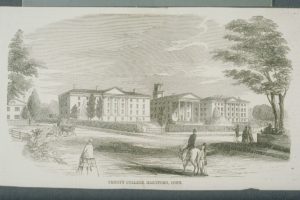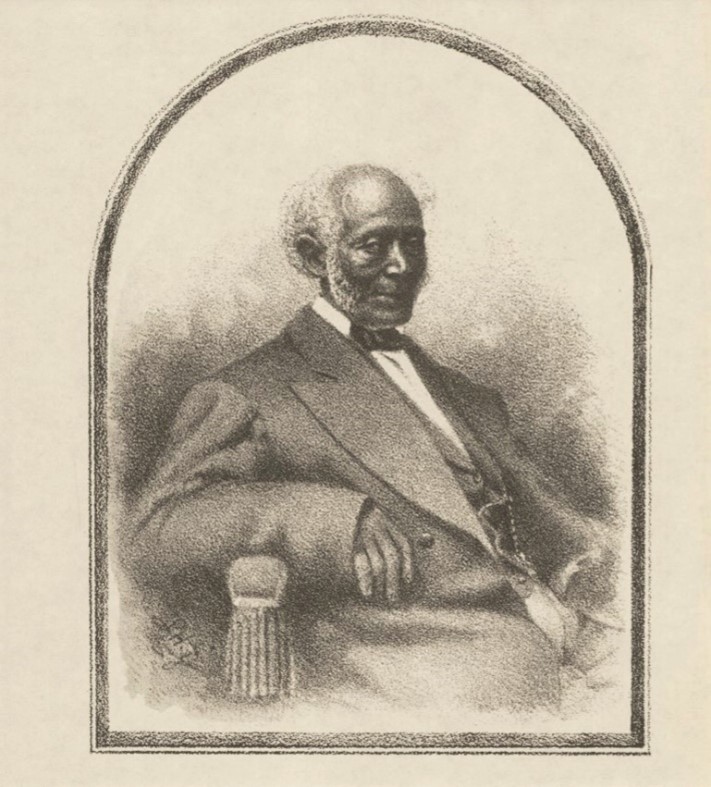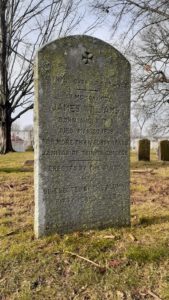By Elizabeth Correia
James Williams was a janitor at Trinity College from the institution’s founding in 1823 until his death in 1878. He became a caricature in student life during this time and a biography entitled The Life of James Williams, Better Known as Professor Jim, For Half a Century Janitor of Trinity College records him as such. As it fabulizes “Professor Jim,” the biography overlooks the gravity of James Williams’ life which began in enslavement from which he escaped to find a home among the Black community in Hartford.

Old Trinity College buildings, Trinity Street, Hartford (1851) – Connecticut Historical Society, Connecticut History Illustrated
James H. Williams was born into slavery on August 3, 1788. His mother was a French Creole woman enslaved by Colonel John F. Robert in Yonkers, New York. James’ father, freed from slavery, visited from nearby stone quarries where he worked. According to the 1800 census, Robert held nine enslaved people at his estate, triple the number most of his neighbors held captive. In 1804, Col. Robert died and willed James to his daughter, who lived in New York City. About a year into this enslavement, Williams found an opportunity to escape when Miss Robert sent him to work at a grocery store on Broadway. As shoppers moved in and out, Williams slipped away with a bundle of clothes and enough money to board a steamer.
This began a transitory period of Williams’ life during which he crisscrossed the Atlantic Ocean on any ship that accepted his labor. He was at sea during the War of 1812, serving on the USS Hornet. Williams was a captive twice more in his life, first on a British sloop of war and second on a pirate ship called the True-blooded Yankee, before escaping. Eventually Williams came to Portland, Connecticut, and found employment at the stone quarries there for two years. He then worked as a servant, gardener, and hostler in Middletown and then as a waiter in Hartford’s City Hotel before Bishop Thomas Brownell hired Williams as a servant.
Finding Work at Trinity College
In 1823, Brownell founded Trinity College (then named Washington College) in the center of Hartford. From the start, Brownell had Williams ring the morning bell and perform janitorial duties. During this time, James met Maria A., a woman from Barbados who was enslaved in Hartford. According to Williams’ biographer, James recalled that “she had no friends in the world, nor had I, and so we were married.” Together in a city largely controlled by upper class white men, James and Maria created a home on Rifle Avenue and from there formed connections with Hartford’s Black community.
The 1870 federal census shows that James had amassed a personal estate of $500, and that he and Maria had taken in and raised a young Alice Gobel, marked as “Mulatto.” Williams often had younger Black families boarding with him but otherwise lived on a street apparently dominated by white families. He found fellowship at Hartford’s Prince Hall Masons Lodge and African Methodist Episcopal Zion Church, of which he was one of the founding members. From its formation in 1833, the church was a center for Black culture and anti-slavery activity. When the church’s first pastor, Rev. Hosea Easton, passed away in 1837, Williams named his son (born that same year) after him. Williams’ hopes for his community can be gleaned from the words of his pastor who wrote that sympathy and the complete abolition of slavery “would kindle anew the innate principles of moral, civil and social manhood, in the downtrodden colored Americans; bidding them arise as from the dead, and speed their way back to the height from whence they have fallen.”
At Trinity College Williams was called “Professor Jim” by students who believed that the college was his livelihood and home, though it likely was of tertiary importance to him behind the family and community he had created off campus grounds. In 1873, Williams’ biographer admits that Williams was not treated seriously, writing, “When he meant to be most solemn, he excited most merriment.” The biography concludes by remembering pranks carried out at Williams’ expense. Williams never reported these pranks to administrators, earning him the epithet “the Professor of secrets.” The details of Williams’ life from Yonkers to Hartford remained equally as secret from Williams’ biographer and other Trinity students. James Williams passed away on May 20, 1878, and received a burial in Old North Cemetery in Hartford, now marked with a stone donated by Trinity alumni as his final resting place.
Elizabeth Correia holds an MA degree in Public History from Central Connecticut State University and works in cultural resource management.










